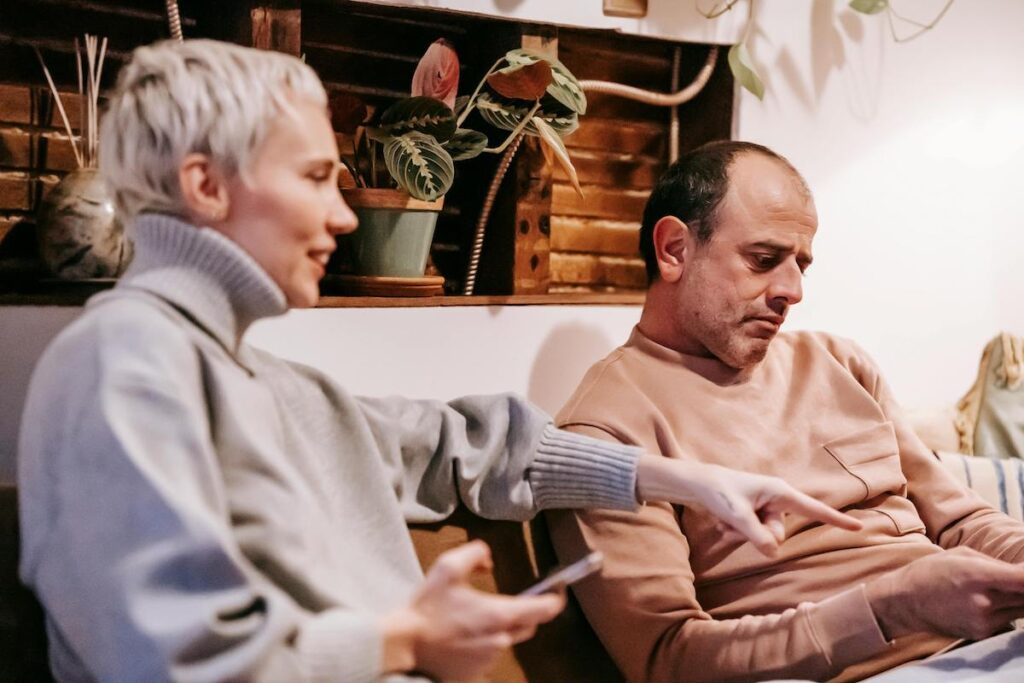Helping a Spouse with Addiction
Living with a spouse who struggles with addiction can be one of the most painful and isolating experiences in a marriage. You may feel torn between wanting to protect your partner and needing to protect yourself and your family. Addiction brings emotional, financial, and sometimes physical turmoil into the home, leaving partners overwhelmed and unsure where to turn. It’s not just the person using substances who is affected — addiction becomes a shared burden that impacts the entire household.
Addiction can cloud judgment, erode trust, and change a person’s behavior in ways that make the relationship feel unpredictable or unsafe. You may have noticed your spouse becoming secretive, emotionally distant, or volatile. You might have experienced broken promises, missing money, or changes in their health or hygiene. All of these signs are red flags that addiction may be taking hold — and that support is urgently needed.
Recognizing the Warning Signs
The signs of addiction aren’t always easy to identify, especially when love and familiarity make it tempting to give the benefit of the doubt. You might attribute changes to stress, work pressure, or other life circumstances. But over time, patterns emerge: consistent lying, unexplained absences, mood swings, and poor decision-making. Substance use may become more frequent or harder to hide. You might find alcohol hidden around the house, notice slurred speech, or observe withdrawal symptoms.
One of the most challenging parts of being the sober partner and Helping a Spouse with Addiction is learning to trust your instincts. If you feel like something is wrong, it probably is. It’s important not to dismiss the red flags or assume that things will just get better on their own. Addiction is a progressive disease, and the earlier it’s addressed, the better the chances for successful recovery.
The Emotional Toll on Partners
Supporting a partner through addiction can lead to burnout, anxiety, and depression. Many spouses take on the role of caregiver or enabler without realizing it. You might make excuses for their behavior, clean up their messes, or try to control the situation through persuasion or punishment. Unfortunately, these actions — while often rooted in love — rarely help and can even allow the addiction to continue unchecked. Resentment, fear, and guilt can become a constant undercurrent in the relationship. You may start to lose yourself in your partner’s problems, putting your own needs and well-being last. In some cases, children are involved, and the emotional strain can ripple through the entire family. When addiction enters a marriage, it doesn’t just damage one person — it disrupts the bond and safety of the relationship itself.
Encouraging Treatment Without Ultimatums
Helping a Spouse with Addiction and convincing a spouse to seek treatment is not always straightforward. Denial is a common barrier, both for the individual with the addiction and for their partner. Your spouse might downplay the severity of their problem, blame others, or insist they can stop anytime they want. On your end, fear of conflict or rejection may stop you from initiating a difficult but necessary conversation.
Timing, tone, and language matter. Approach the conversation calmly, with specific concerns, and focus on how their behavior is affecting you and the family rather than issuing ultimatums or threats. Compassion is key, but so is clarity. Let them know that you’re willing to support their recovery but that help is non-negotiable if the relationship is to move forward in a healthy way.
Suggesting addiction treatment options can help make the idea more tangible. Introduce them to programs such as outpatient care, detox, or residential treatment, depending on their needs. A center like The Wave of North Florida, located in Lake City, offers a variety of services that can help your spouse begin the process of recovery in a structured, professional setting.
Establishing Healthy Boundaries
Boundaries are essential when living with someone who struggles with addiction. They are not punishments but rather tools to protect your well-being and provide clear expectations. Without boundaries, the cycle of enabling and resentment continues. With them, you create a framework for respect and responsibility. Healthy boundaries might include refusing to lie or cover for your spouse, declining to give them money that may be used to purchase substances, or requiring sobriety before engaging in certain shared responsibilities. These lines need to be communicated firmly and consistently. Boundaries often require consequences when broken, which can be emotionally painful, but they are necessary for your partner to recognize the impact of their actions.
Support groups for spouses of people with addiction — like family therapy or peer groups — can provide guidance on how to create and uphold these boundaries without losing your sense of self in the process.
Treatment Options for Spouses
Not all treatment programs are created equal. Your spouse may benefit from inpatient rehab if their addiction is severe or long-standing. This type of care provides round-the-clock supervision, detox services, and intensive therapy. For others, a partial hospitalization program (PHP) or intensive outpatient program (IOP) may be more appropriate. These models allow patients to receive structured care while continuing to live at home or in a supportive housing environment.
Dual diagnosis treatment is also important to consider. Many people with substance use disorders also struggle with mental health conditions like depression, anxiety, or trauma. Treating both at the same time increases the likelihood of long-term success. The Wave of North Florida specializes in providing comprehensive care that addresses co-occurring disorders and offers personalized treatment plans to meet each client’s needs.
It’s worth noting that stepping outside your hometown for treatment can be beneficial. A fresh setting, like Lake City, allows your spouse to distance themselves from the triggers and environments that contribute to their addiction. Even if you live in a nearby city such as Jacksonville, Gainesville, or Tallahassee, The Wave offers a convenient yet transformative option for healing.
Your Healing Matters, Too
Supporting a loved one in recovery does not mean ignoring your own needs. In fact, taking care of yourself is essential if you want to be a stable, healthy support system. Counseling, therapy, and support groups can help you process your emotions and learn tools to cope with the uncertainty and grief that often accompany addiction in a relationship.
Many treatment centers also offer family therapy, allowing couples to work through issues together as the partner in recovery progresses. This type of shared healing fosters communication, accountability, and understanding. It also provides a chance to rebuild trust and discuss the future of the relationship on solid, sober ground.
Recovery is not a quick fix, and setbacks may occur. Patience, boundaries, and mutual commitment are the cornerstones of moving forward — and it’s okay to ask for help along the way.
A Path Toward Hope
When your spouse is battling addiction, it can feel like your life is in limbo. Each day may bring new challenges, heartache, and uncertainty. But there is hope. Treatment works, families heal, and relationships can be rebuilt. The journey may be long, but with the right support and resources, recovery is not only possible — it’s sustainable.
The Wave of North Florida is here to help you and your spouse take the next steps. Whether you’re in Lake City or another city nearby, our team is committed to providing compassionate, individualized care that respects the courage it takes to begin this process. Together, we can help your loved one reclaim their life and help you rediscover peace, strength, and stability in your relationship.



